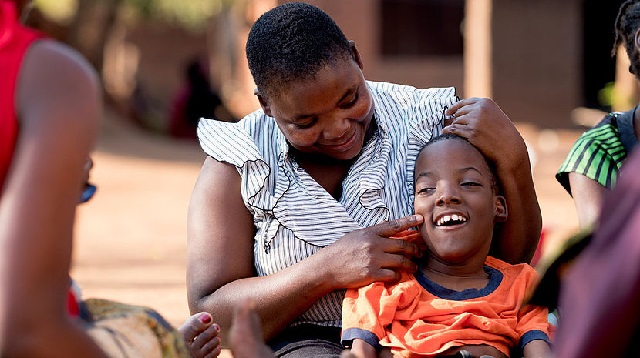
Rubella’s double jeopardy: A mothers pain of raising deaf-blind children

Kampala, Uganda | THE INDEPENDENT | Maimuna Ssentamu was ecstatic when she discovered that she was pregnant with her first child in 1994. The surprise child had been planned for over a period of time, and the pregnancy was believed to be the new source of joy, love and pride in her home.
However, the child she lovingly nurtured in her stomach was different at birth. She realized her son’s eyes were not clear. They were blurred.
Ssentamu narrates that to her shock, doctors said she had suffered from Rubella during the term of her pregnancy, a condition which resulted in deaf-blindness for the unborn child. At six weeks, the child was taken for his first operation to correct his eyesight. After more than 10 eye operations 25 years later, he is still partially blind and completely deaf only relying on tactile communication to connect with the others.
Rubella, also known as German measles, is a contagious disease caused by a virus. Its symptoms include; fevers, sore throat and a rash that starts from the head and spreads to other parts of the body. It is estimated that the disease is the leading cause of deaf-blindness.
Dr Immaculate Ampaire, the Deputy Manager of the Uganda National Expanded Program on Immunization –UNEPI says that Rubella is a deadly disease that people suffer from unknowingly. She adds that while Rubella is a common disease, some of its symptoms make it hard to treat or even prevent spreading due to its short incubation period.
Olive Bwana, a mother to a 36-year-old Bidson Bwana, who is deaf-blind due to Rubella says that her son’s condition has forced her to give up on her own personal pursuits to focus on him, while at the same time, she has to handle the various mood swings that the disabilities present.
“Having two disabilities is hard. Not being able to see and hear is hard enough when a person has one condition. When they have both, it’s another thing altogether. Bidson’s anger and bouts of being short-tempered leave me feeling helpless at times,” Bwana said.
Rubella can be prevented through immunization. A number of developed countries have been using the Measles, Mumps and Rubella vaccine to fight the disease since the early 1970s. This vaccine was introduced to Uganda a few months ago following reports of rubella outbreaks in various parts of the country in 2017 and 2018.
Dr Ampaire says that in the outbreak that begun in late 2018 and carried on to 2019, 25 cases of the disease were reported among children. Up to 18 million children were vaccinated in the drive held at the end of last year.
However, there was a lot of public mistrust about the vaccine and why it was being administered. The mistrust was increased by reports that some of the children vaccinated suffered from adverse effects such as rushes and falling sick. But Dr Ampaire says that despite all the reports, the vaccine is the only way to protect mothers and children against the disease that can lead to deaf-blindness, if not treated.
“The only way that has been tested and proved to prevent Rubella is the vaccine. Yes, it has some side effects and these are expected, but they are minor and not permanent like deaf-blindness,” Dr Ampaire added.
It is estimated that 973,000 people in Uganda live with either a mild or severe form of deaf-blindness. Data from Sense International Uganda shows that 80 per cent of the cases are as a result of Rubella also known as Germany measles.
Chris Iga, the director of Sense International-an organization that advocates for equal rights for persons living with deaf-blindness says that many people do not know that Rubella can cause deaf-blindness. He says that while many still attribute the condition to witchcraft and effects of family planning, not many know that the condition is caused by a preventable disease that mothers pass on when pregnant.
******
URN
The post Rubella’s double jeopardy: A mothers pain of raising deaf-blind children appeared first on The Independent Uganda:.
0 Response to "Rubella’s double jeopardy: A mothers pain of raising deaf-blind children"
Post a Comment